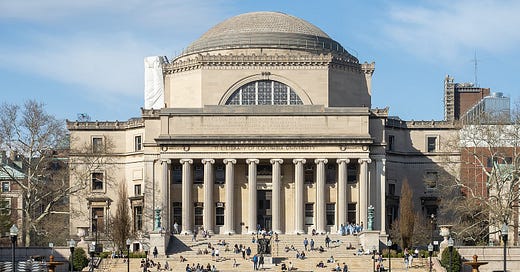The Trump Administration’s Attack on American Higher Education
Efforts to stifle independence and cultivate silence could succeed, but there is an antidote
The US is a global juggernaut in higher education. College and university enrollments are around 19 million students. Eager, creative, and ambitious minds come from around the globe to study at American universities that are ranked among the world’s best, yielding over 1 million enrollments. Many international students remain in the US to found and work for productive companies, contributing tens of billions of dollars to the economy. And college degrees pay: graduates enjoy considerably higher salaries than those who don’t attend college, and those gains outpace the investment in tuition for most fields.
There is not some sort of ideological filter on this either. Right, left, and centrist members of Congress nearly across the board have degrees from prestigious American universities. The same is true of all Supreme Court justices. And it’s true of Donald Trump and J.D. Vance. To be sure, universities have become synonymous with “wokeness” and many university faculty lean liberal – some very heavily. But professors are also professionals. The chemists teach chemistry, the engineers teach engineering, and the political scientists (myself included) teach how politics works – and not simply what they’d like it to be.
Professors are people, though, and we have opinions about how we think our government should work just like everybody else. That presents an opportunity to politicize higher education in order to grab and consolidate power and influence and to silence dissent. There is a growing crowd of right-wing populists – from Orban in Hungary to Erdogan in Turkey and, now, Donald Trump – who lean on culture wars to paint professors as radical ideologues interested more in indoctrinating students with their personal views than in teaching their professional expertise.
In recent weeks, Trump has gone from browbeating colleges and universities over how they handle protests, free speech, and diversity, equity, and inclusion (DEI) initiatives to weaponizing federal research funding in an effort to generate fealty and compliance. Universities are starting to be singled out one by one in an effort to divide and conquer them.
Columbia University has become a testing ground for this shift. Like many other universities, Columbia became embroiled in conflict over pro-Palestinian activism last year as Israel’s war with Gaza raged. Protests snowballed into campus occupations that became a flashpoint between students, university administration, and the police. Republicans railed against the chaos and the lack of protections for Jewish students that were being threatened. They dragged the presidents of Harvard, MIT, UPenn, and Columbia into charged Congressional hearings that ultimately led to the resignation of most of them from their positions.
In early March, the Trump administration canceled $400 million in federal grants and contracts to Columbia over “inaction in the face of persistent harassment of Jewish students.” And it demanded a series of interventionist reforms as a precondition to restoring funds. Columbia caved to all of the administration’s demands, promising to change its protest policies and security practices and acceding to overhaul its Middle Eastern studies department.
Has Columbia made mistakes? Lots of them. Its leadership in the face of campus protests and debates over speech has been slow, equivocal, and reactive. When protesters broke into its buildings and vandalized them, it took no significant disciplinary action. The back-and-forth hearing between its president and a Congressional committee was a wreck.
But weaponizing federal funding in order to trample on academic freedoms and to police speech and students is a dire step that won’t end with Columbia or even with universities. Other universities like UPenn are already being singled out for other reasons. Universities are starting to self-censor on policies related to diversity, free speech, and other values that they have long prized as core to their missions. One by one, heads are ducking.
Right-wing populists elsewhere have run the same playbook, with grave consequences for freedoms and democracy. Consider Viktor Orbán’s treatment of Central European University (CEU) in Hungary. CEU gained a reputation for its advocacy of liberal principles and multiculturalism – values that Orbán’s brand of authoritarianism found threatening to conservative, nationalist, and Christian culture. So Orbán imposed a series of well-tailored university regulations that effectively singled out CEU for persecution, and he eventually forced it into exile in Austria. That silenced an important voice for democracy in Hungary and removed talented people – and their democratic opposition to a government sliding into dictatorship.
Trump’s attacks on universities are similarly motivated to silence independent voices and muzzle potential opposition. And they are replicated through recent attacks on high-profile private law firms like Paul Weiss that have opposed him in the past. The goal is transparent: to stifle dissent and alternative, inclusive visions for society while empowering loyal rivals. As Trump put it regarding law firms: “firms have to behave themselves.”
In the face of these threats, universities, law firms, and other organizations that seek to retain their independence and freedoms need to coordinate to protect themselves. That will require drawing on resources and building networks of mutual legal and even financial support in order to weather attacks on some. Absent that, it should be unsurprising if they are singled out one after another. That would make them all worse off, and it would render American democracy more vulnerable to continued power grabs.
Note: The leading image is a photo of the Low Memorial Library at Columbia University. From Wikimedia Commons.





I would disagree that diversity (as implied in most DEI policies) is core to the university's mission, as a broad institution. But I would strongly agree that using federal money to alter the content of courses or the makeup of the faculty would destroy that mission.